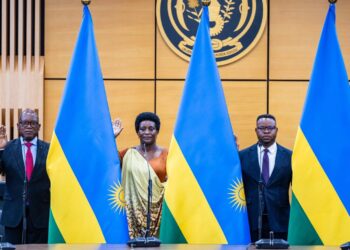Rwanda earned $647 million from tourism in 2024, marking a 4.3% increase from the previous year, according to a new report by the Rwanda Development Board.
The growth was largely attributed to a 27% increase in revenue from gorilla trekking and an 11% rise in air travel. A total of 1.36 million visitors came to Rwanda last year, with gorilla-related tourism alone generating $200 million.
The board’s annual report showed the Meetings, Incentives, Conferences and Exhibitions (MICE) sector brought in $84.8 million. Rwanda hosted 115 conferences in 2024, drawing more than 52,000 delegates from around the world.
RDB CEO Jean-Guy Afrika credited the performance to strong partnerships and increased international confidence in Rwanda as a destination for tourism, investment and innovation.
“I sincerely thank our development partners, investors, visitors and stakeholders. Your trust and commitment have played a significant role in positioning Rwanda as a global hub for trade, tourism and innovation,” he said.
The government aims to increase tourism revenue to over $700 million in 2025 and attract at least $3 billion in new investments. Priorities include expanding industrial zones, enhancing service delivery through digital solutions, and protecting biodiversity to support innovation and job creation.
In 2025, Rwanda is set to host major global events, including the 20th edition of the Kwita Izina gorilla-naming ceremony and, for the first time in Africa, the UCI Road World Championships.
Investment and exports rise
Rwanda registered $3.2 billion in new investment commitments in 2024, surpassing its $2.4 billion target. This represents a 32.4% year-over-year increase and is expected to create more than 51,600 jobs.
Key investment sectors include manufacturing, renewable energy, agriculture-based industries and mining. The report emphasized that this investment will contribute to long-term economic growth.
Exports also rose significantly, reaching $4.2 billion in 2024 — a 22% increase from the previous year. Growth was driven by expanded trade with the United Arab Emirates and Luxembourg, and a 33% increase in cargo transport through RwandAir.
RDB said it supported more than 240 companies in accessing regional and international markets through training, regulatory support and digital trade platforms. Cross-border traders were also equipped with the necessary tools to compete globally.
These efforts helped Rwanda rank first in Africa and 19th globally in the World Bank’s B-READY 2024 report, which evaluates how countries facilitate investment and ease of doing business.
“Our focus remains on improving service delivery, growing industrial parks and promoting digital innovation,” Afrika said. “These strategies will support entrepreneurship, job creation and ease of investment.”











